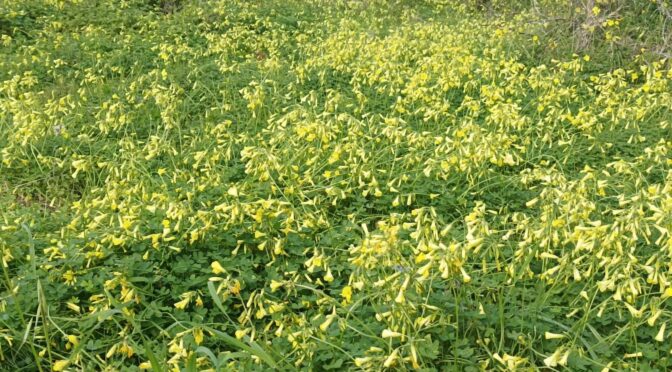Views: 1111
January is usually the month of the Bermuda buttercup. This plant paints vast agricultural fields and roadside edges yellow, shining under the sun against the dominant green of the winter landscape.
People notice it, admire it, and sometimes feel moved by its burst of beauty. But some things, like coins, have two sides. And the Bermuda buttercup has a darker side, often hidden beneath its dazzling natural display.
Originally from southern Africa, it is spreading worldwide and is classified as an invasive exotic species. Sometimes toxic to livestock, it has a remarkable ability to spread underground, forming a network of roots and small bulbs. It eventually colonizes entire areas, inhibiting the germination of other plants’ seeds.
In Menorca, it is also known as flor d’avellana or fel-i-vinagre. Yet its magnificent floral display actually signals a process of biodiversity loss, gradually transforming the area into a monoculture.
It is a succession that, as we can see, does not contradict aesthetics. Some images can move us with their beauty, while concealing a disturbing reality. There is also an aesthetic to war, to industrial zones, to bullfighting…
Lately, some neighborhoods have been reshaped with stunning renovations, featuring charming boutique hotels and high-end restaurants. But if there is no counterbalance, the result may be an exquisite place devoid of local life—like a field of Bermuda buttercups.
Some years ago, the red palm weevil arrived in Menorca. A beetle native to tropical Asia, it has spread across the world, usually hidden inside palm trees transported for landscaping purposes. This little creature, too, is a marvel of nature.
Adult weevils fly to palm trees and lay their eggs. Once hatched, the larvae—plump and white—feed on the tree trunk for months. In some African regions, they are highly sought after as food, but there is no such tradition in our lands. Here, they have virtually no natural predators.
Once fully grown, the larva cocoons itself. Inside the capsule, its body is completely restructured, undergoing one of nature’s fascinating miracles—emerging as a striking reddish beetle.
Weevils have their preferences. They are particularly fond of date palms. But in the coming years, they are likely to attack other species as well—fassers (Mediterranean fan palms) or, even more worryingly, garbons (dwarf palms).
Weevils are much like certain investment funds, always managed by people in impeccable suits. Driven purely by self-interest, they gain control over strategic industries and essential public services. On the outside, democracy may look the same, but within, it is being hollowed out, its vital core reduced to sawdust.
Farmers who have fought fields overrun by Bermuda buttercups say the best time to act is precisely when they are in bloom. The plant expends so much energy producing flowers that the bulb is weakened. It takes vigilance and persistence, but if uprooted at the right moment, the infestation loses much of its strength. Everything has its weak point.
(This text is an adaptation of the original article published by Miquel Camps, as coordinator of territorial policy for the GOB, in the Menorca newspaper on 03/02/2025).

